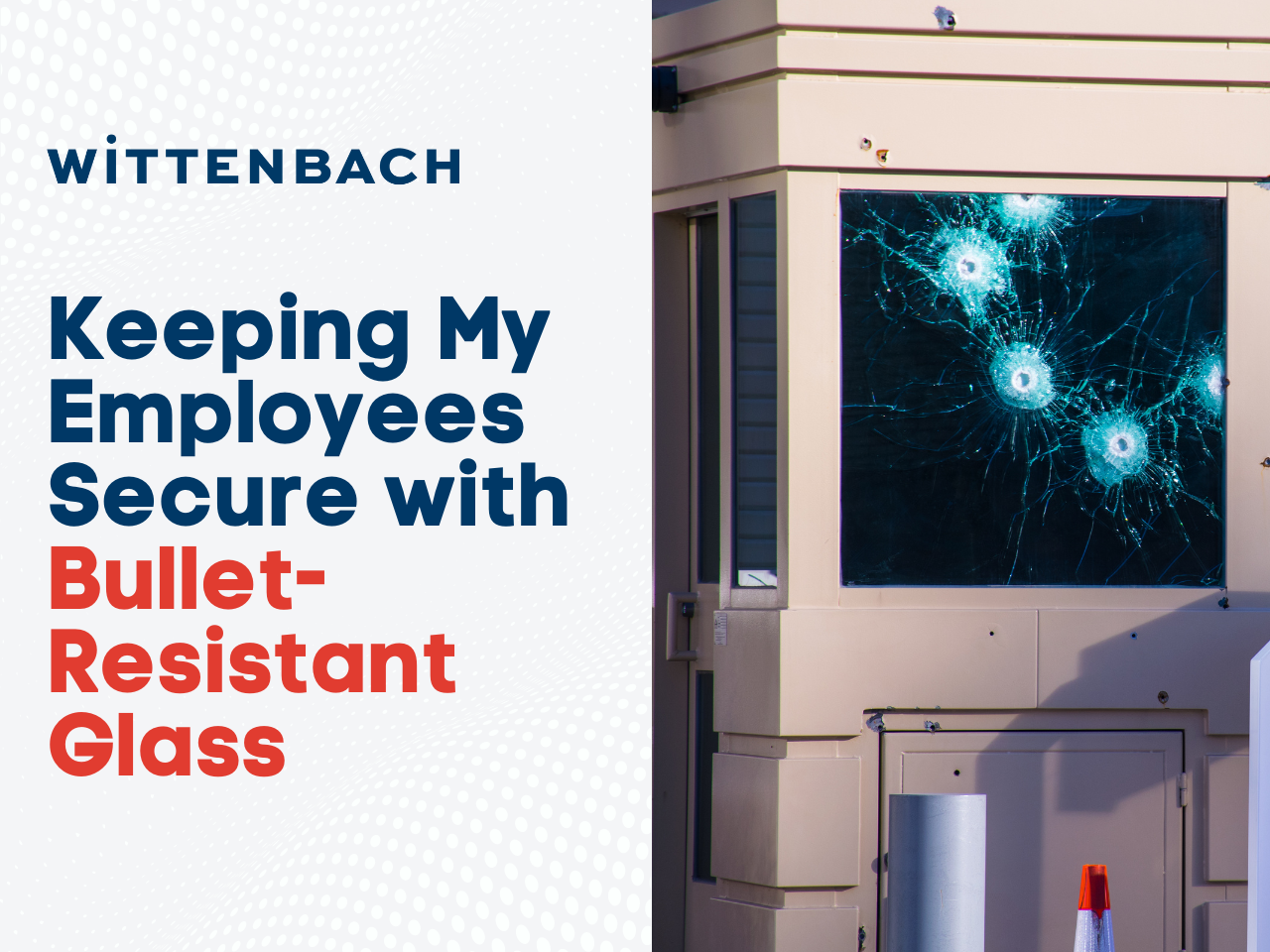Have you been wondering, “What are the best methods for keeping my employees secure?” You are not alone. Physical branch security takes many forms at banks and credit unions, including protecting your employees and clients from the unthinkable. In the event of an armed intruder or extreme weather event, having bullet-resistant glass installed at your branch can make a remarkable impact on efforts to deter crime or damage.
Bullet-resistant glass is not a replacement for other physical and electronic security systems that protect against determined criminals. However, it does offer a layer of external protection and peace of mind, both in the walls of your branch and drive-thru lanes. Below, we’ll discuss the efficacy of this glass, considerations when upgrading windows at your branch, and recommended products to protect the lives and valuables within your institution.
What is bullet-resistant glass, and how is it made?
The terms “bulletproof” and “bullet-resistant” are nearly interchangeable descriptors that cover a certain segment of durable polycarbonate material that insulates businesses from would-be armed attackers. “Bullet-resistant” is more technically correct, as no window is 100% “bulletproof”. A barrage of bullet impacts—especially depending upon caliber—could possibly break through nearly any window structure.
Per Glass Doctor, “…the concept of bullet-resistant glass was stumbled upon quite by accident in the 17th century, but it wasn’t until 1903 that the quest of researching and developing “bulletproof” glass began. Modern ‘bulletproof’ glass was first patented by French chemist, Édouard Bénédictus in 1909.” While it’s certainly not a new concept, the methods of testing and fortifying bullet-resistant glass are evolving.
Modern bullet-resistant windows are comprised of numerous layers, absorbing impact with bonded sheets of glass and polycarbonate plastic. The material is then laminated and vacuumed, making it transparent eliminating structural vulnerabilities caused by internal air pockets. The thicker the glass, the more impact it can absorb; however, extreme thickness does present tradeoffs in clarity and weight. Extreme thickness and heaviness could potentially add to the construction cost of safely retrofitting a building.
In banks and credit unions, bulletproof glass can be found in entry vestibules, around the perimeter of the building, and in drive-thru lanes where exterior transactions occur. Riotglass outlines several benefits of bullet resistant glass to financial institutions:
- Acting as a strong deterrent to bank robbery
- Protecting employees during armed robberies or active threat attacks
- Keeping bad guys on the other side, even if penetrated by bullets
- Allow full visibility and easy cash transactions via pass-thru trays or windows
- Acting as germ barriers/sneeze guards for mitigating the spread of viruses (like COVID-19)
Bullet resistant glass also serves a protective purpose in virtually any setting in which an intruder might try to forcefully obtain money, valuable property, or privileged information: pharmacies, embassies and other government buildings, and high-security research facilities, to name a few.
How is bullet-resistant glass tested? How effective is it, really?
While armed robberies of banks or credit unions are less common than Hollywood makes them seem, there were approximately 1,964 in the United States in 2021, as reported by the FBI. Only 121 reported having bulletproof enclosures—a signal to the institutions in need of an upgrade that bullet-resistant glass can deter crime.
U.S. Bullet Proofing explains that the most common ballistic standards are UL 752 and the National Institute of Justice (NIJ). “The ratings for levels of bullet resistant glass are calculated by the protection the glass offers, based on the number of rounds fired before it breaks as well as the size of the weapon used. […] To be at the highest bullet proof glass levels, the entirety of the system — including the glazing material, frame and anchors — must be capable of absorbing the force from the projectiles. Simply having bullet proof glass installed in the framing system is not enough. The entire system must be rated highly enough to ensure the maximum level of protection.”
The UL752 rating system contains eight levels which calculate strength based on ammunition caliber and number of shots. The NIJ Standard system rates ballistic resistant protective materials across six categories, again accounting for the type of ammunition and required number of hits per specimen.
Window manufacturer Alco stresses the benefits and building code requirements of impact-resistant windows, protecting facilities both on coastlines and inland from hurricane-force wind damage. “Impact products are always tested to withstand flying debris up to 200 MPH. The impact-resistant film and the inner membrane technology give your building the ultimate protection against a category five hurricane. Impact products must undergo other rigorous testing procedures for air pressure, water penetration, and structural testing.” These windows must also meet “egress window” requirements, meaning that they can withstand a level of damage but still serve as an emergency escape if necessary.
Hamilton Vision Series Windows
Wittenbach partner and security industry titan Hamilton offers an array of physical security products that reinforce your financial institution. Their Vision Series glass and frames can be implemented as exterior branch windows, as well as in a drive-thru format that integrates with a secure transaction drawer. Per the Hamilton website:
- Hamilton Vision Series Windows are constructed using rugged stainless steel frames and bullet resistive glass. Both the frame and glass are UL-Rated.
- Hurricane Rated:
- Approved by Miami-Dade County, Florida building code compliance
- Approved for second-story installations
- Standard sizes include 3’x5′, 3’x6′, 3’x8′, 3’x10′, 3’x12′, and 3’x15′. We make custom sizes as well!
Allow Wittenbach’s seasoned experts to help you choose the right bulletproof glass windows to outfit your branch! Not only do we have deep partnerships and installation experience, but we truly understand the unique security needs of financial institutions and other business in which the flow of employees, clients, information, and valuables must be protected around the clock. Contact us to discuss your next physical security project today.





